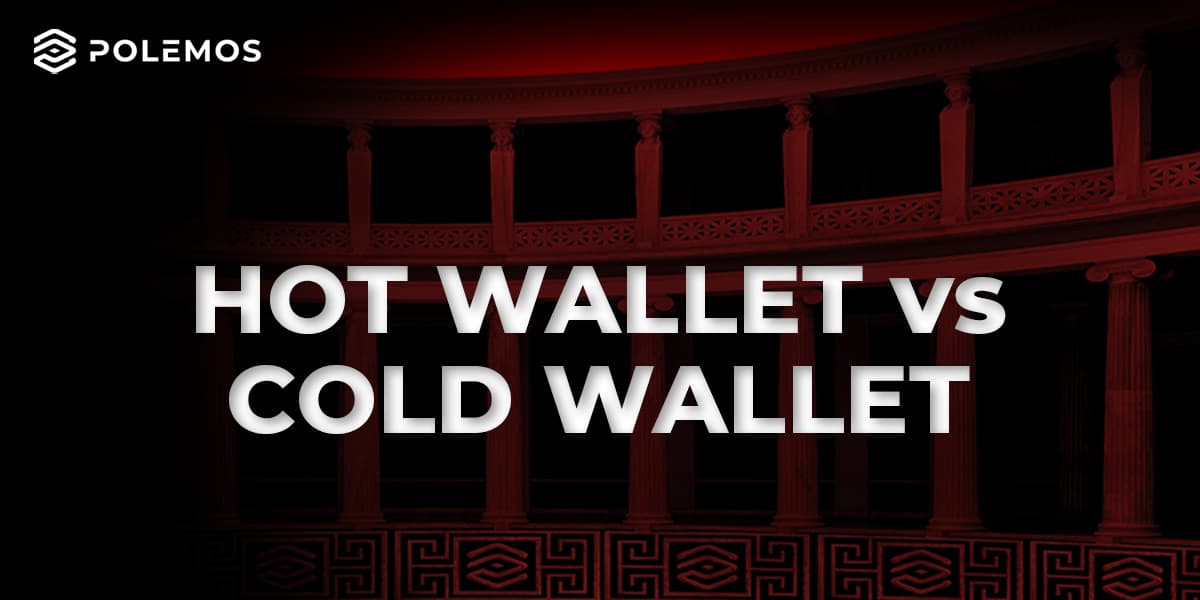Crypto wallets are often a topic of conversation in the web3 space and are essential for the safe storage of funds. To understand which wallet best suits your needs, you must know the difference between a hot wallet and cold wallet, and how they work together.
What is a Crypto Wallet?
A crypto wallet stores private keys, or passwords, that allow you to store, send, and receive cryptocurrencies. Crypto wallets are either downloadable as a software or come as physical hardware. Some of the most popular hard and cold crypto wallets include Coinbase Wallet, MetaMask, Mycelium, and Ledger.
What is a Hot Wallet?

A hot wallet is a software application that is always online for ease of use in storing, transferring, and receiving tokens. Hot wallets come in the form of mobile, web, or desktop wallets. It is almost always necessary to have a hot wallet for blockchain games.
Reasons to Use a Hot Wallet
A hot wallet is an optimal choice for ease of use. Hot wallets are convenient for those who make frequent crypto transactions. This is because the funds are always online, mitigating the time-consuming process of switching the application from offline to online. Hot wallets make it easy to buy, sell, or transfer cryptocurrency within minutes.
Although a hot wallet is easy for users to access, hackers can also breach hot wallets effortlessly if users aren’t careful. For this reason, many frequent traders don’t keep a significant amount of coins in a hot wallet.
What is a Cold Wallet?
A cold wallet is a physical device that lives offline. Cold wallets typically come in the form of hardware but can also be paper wallets where private keys are stored, a secondary offline computer, or even a physical bitcoin that contains private keys hidden under a hologram.
A cold wallet stores your private keys, an essential component of most smart contracts ruling the blockchain.
Reasons to Use a Cold Wallet
Cold wallets are considered far more secure than hot wallets. For someone to get ahold of private keys on a cold wallet, they have to be in physical possession of the cold wallet, making it virtually impossible for hackers to infiltrate crypto funds.
Another security feature of the cold wallet is that even though the device has to go online for a transaction, the transaction is officially executed “in-device” with a Digital Signature Algorithm (DSA). As defined by Gemini.com, the “Digital Signature Algorithm (DSA) is a specialized standardization for the creation of digital signatures that are used within public-key cryptography (PKC) systems such as blockchains or related computing infrastructure.” This means that even if a hacker sneaks malware onto your computer, the “signature” for the transaction won’t match what the owner assigned, thus thwarting the hacking attempt and keeping your crypto safe.

The downside of a cold wallet is the inability to replace lost keys. Losing keys to your cold wallet effectively locks you out of your funds forever.
Though this is not necessarily a con, the price is a component to note about cold wallets. Hot wallets are typically free, but cold wallets can have higher price points than some users are willing to pay. There are many unknown brands selling crypto wallets at prices that are too good to be true—and for a good reason—they are incredibly unreliable.
The most important difference between a hot wallet and cold wallet is here.
If you are going to protect your crypto funds, take the time to research a reputable brand that fits your price point. The Ledger Nano S is an excellent hardware wallet on the lower end of the price spectrum, running anywhere from $60-80. On the expensive end, the Trezor T averages about $250. It is strongly recommended to only purchase these devices from the original manufacturer. Amazon and eBay may seem like great places to score a good deal, but the risk of purchasing a counterfeit wallet runs rampant.
Difference Between a Hot Wallet and Cold Wallet
Just as most individuals have both cash and a bank account, most crypto users on the blockchain have both a hot and cold wallet. Hot wallets are essential for many transactions online and allow you to do so quickly. To keep your funds safe offline, keeping a cold wallet in tandem with a hot wallet is a secure and efficient strategy for protecting your cryptocurrency while maintaining ease of use. Secure storage and transactions should always be a priority regardless of how much crypto you own. Protect your investment.
Now that you understand the difference between a hot wallet and cold wallet, make sure to share it with your friends! It might help them avoid scams.















